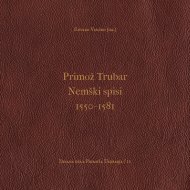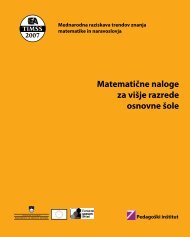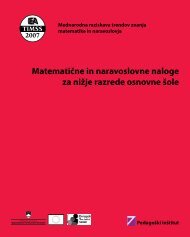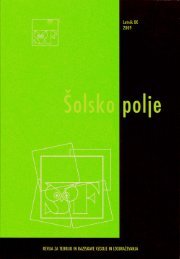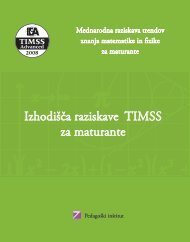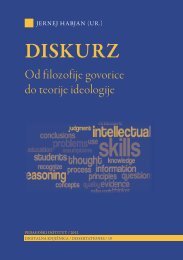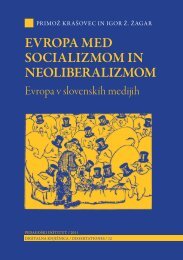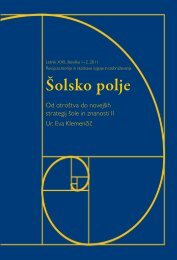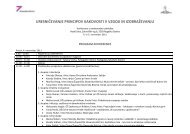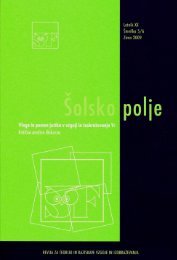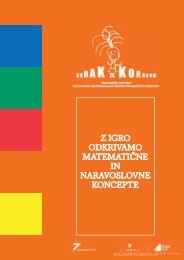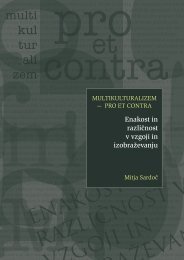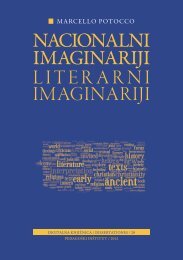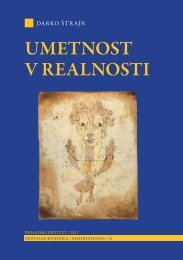1. PDF dokument (3365 kB) - dLib.si
1. PDF dokument (3365 kB) - dLib.si
1. PDF dokument (3365 kB) - dLib.si
- No tags were found...
You also want an ePaper? Increase the reach of your titles
YUMPU automatically turns print PDFs into web optimized ePapers that Google loves.
Povzetki/AbstractsRights vs tolerance. Incongruity of Mentalities: Historico-anthropologicalmarginalia on the Slovenian Translationof the Declaration of the Rights of Man and theCitizen from the 26th August 1789In the first section of this paper we examine – by means of historical anthropologyand discur<strong>si</strong>ve analy<strong>si</strong>s – the context of individual articles in theDeclaration of the Rights of Man and the Citizen from 1789, while in its secondsection we turn out critical attention to the official Slovenian translationof Article X. We try to show the ba<strong>si</strong>c distinction between the regimeof tolerance (religious tolerance that later evolved into and was replaced bycivic tolerance) and the regime of rights (rights of men and citizens). It is arguedthat the social mechanisms of tolerance are almost always connected tothe hierarchical social structures, and by that the subject who possesses thetolerance by his own will and by the strategies of power gives permis<strong>si</strong>on andgrants something to the subject who has neither the power nor the right todo it. It was pos<strong>si</strong>ble for the Declaration of the Rights of Man and the Citizento bring about a new configuration of social relations once it was no longerused within the context of religious dispo<strong>si</strong>tive deployment and applied insteadto a completely different social and epistemic (discur<strong>si</strong>ve) order.Key words: Declaration of the Rights of Man and the Citizen, translation,appropriation, mentality, rights, toleranceJana S. RoškerMultikulturnost in diktatura strpnosti: primer KitajskePričujoči članek problematizira koncept strpnosti v kontekstu t. i. multikulturnihinterakcij. Na konkretnem primeru tradicionalne in sodobne Kitajskeprikaže relativnost in kulturno pogojenost domnevno univerzalnih vrednot, hkakršnim sodi ta koncept, ki se navezuje tudi na koncept takoimenovanih temeljnihčlovekovih pravic. Na osnovi analize tovrstnih primerov avtorica nazornoprikaže, da je pojem strpnosti sklop idejnih in ak<strong>si</strong>oloških konotacij,značilnih za zahodne družbe in njihove ideološke aparate. Takšne konceptestrpnosti seveda vseskozi zagovorajajo zagovorniki liberalizma in pluralizma.Zato je v soočanju z multikulturnostjo v sodobnih globaliziranih družbah tolikobolj pomembno, da vprašanj, kot so migrantstvo, izgnanstvo ali hibridnost,ne postavljamo preprosto v nasprotje z ukoreninjenostjo, nacijo in avtentičnostjo,temveč da lociramo in ovrednotimo njihove ideološke, politične in čustvenepovezave ter njihove preseke v večplastnih zgodovinah postkolonialnosti.Ključne besede: postkolonialne študije, multikulturalizem, kritika strpnosti,univerzalnost, človekove pravice207



